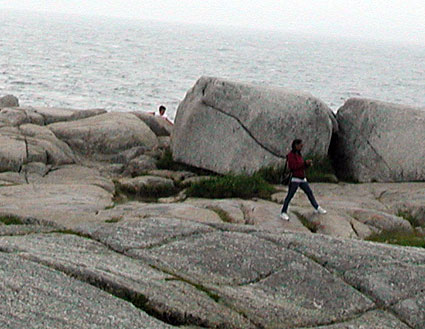I went to the Coronation Street event Tuesday evening. The Halifax DownEast Streeters brought Steven Arnold who plays Ashley Peacock on ŌĆ£the StreetŌĆØ over to talk and answer questions to an audience of seven hundred people. (And by the way, about a third of the audience were men.)
Steven Arnold is much better looking in person than on the show. Apparently he is an avid boxer, works out. HeŌĆÖs also a very personable, intelligent, lively, playful young man (thirty-three and singleŌĆöhe had a lot of offers from the audience!) with a good sense of humor and propriety. Some of the questions the audience asked him were a bit off color, not appropriate, but he answered them with diplomacy, was very impressive. He refused to give any spoilers, but did so with humor. He also refused to say anything unpleasant about anyone on the show: the cast, the directors, the writers. It is obviously a very good place to work. The cast seem to genuinely like each other and to work well together.
One of the more intelligent questions to him was about the quality of the drama. It seems that over the past couple of years the level of disasters and crime has increased dramatically. The person asked if this was being done to attract a younger audience. He said yes, you have to go with the times. That says a lot about our culture, and not a happy lot.
I went to a play Saturday night. (I wonŌĆÖt mention the name because I found it didnŌĆÖt satisfy. No point.) It was neither here nor there, neither comedy nor serious. The one-person skit started out with energetic farcical energy, very funny. It went on too long in that vein but wasnŌĆÖt funny any more. Then it became heavy, ponderous and ended flat. The friend I went with said afterwards she can suspend belief in the theatre but not in the movies. She was willing to give it more respect than I did. I almost fell asleep in the middle.
So what does it take to make you suspend belief? I can get totally involved in movies, books, TV shows, plays. Often when I am with someone watching TV and am getting visibly upset by a story, by the way people are acting or things that are happening to them, the person with me will say: Leya, it is only TV! Sometimes I donŌĆÖt answer the phone when I am involved in a show. At least in a movie itŌĆÖs dark and my reactions are more my secret.
Books are another story. Sometimes I get so involved in what is happening, I must read it, even if it keeps me up most of the night. Other times I find I have to put it down before I get to that point just because it is so overwhelming. Then, sometimes, I just canŌĆÖt relate to the story or the characters; it puts me to sleep. With a book, at least, thereŌĆÖs the option of putting it down. Walking out of a theatre is more dramatic.
Last year was the first time I can remember when I actually didnŌĆÖt finish reading a novel once I had started it. It was liberating. To admit a book just wasnŌĆÖt for me. So maybe I will walk out of a theatre productionŌĆösomeday, maybe.
I went to see a couple of Samuel Beckett plays last night: Not I and KrappŌĆÖs Last Tape, with Janice Jackson and Timothy Leary. The production was very good, well acted, fascinating. I used to go to as many Beckett plays as I could when I lived in New York and IŌĆÖve read a few of his novels. IŌĆÖm attracted to his stark, challenging, unsettling writings. So it was exciting for me to see Becket being performed in Halifax. Word had gotten out and the theatre was full.
I loved the experience of sitting in the dark theatre watching the disembodied mouth talking talking talking aboutŌĆöwhat felt like her indefinite, disembodied experience. I was mesmerized by the mouthŌĆÖs movements, spent the first five minutes, at least, trying to figure out how it was done and not listening to the words at all. When the lights went on it was shockingŌĆöto be back in a room, a place. You can see a portion of the play with Billie Whitelaw playing The Voice on YouTube.
The plays question how to integrate various parts of our lives, our selves and what is our self. It is often uncomfortable for anyone to hear our voice on a recording, to hear our own voice talking, especially in the past, to hear the choices we made, what ŌĆ£mightŌĆØ have been, to recognize our regrets being voiced about the past.
Krapp saw a conflict between love and art. He gave up love for his writing yet was a failure there too. I remember a time when I could only ŌĆ£doŌĆØ one activity at a time. I could concentrate on my painting only at the sacrifice of other aspects of my life. Fortunately that time has past and my artwork is very naturally part of my day. There is a lot to be said in favor of seasoning, growing older,
I went to see Edward Albee’┐Įs The Goat Friday night (his 2002 Tony Award winning play). I saw ’┐ĮWho’┐Įs Afraid of Virginia Wolfe’┐Į several times when I lived in NYC but I had never seen this one. The story was outrageous; the theme was the many ways of loving. In Edward’┐Įs words (from the program) ’┐Įit’┐Įs about love, and loss, the limits of our tolerance and who, indeed, we really are.’┐Į One of my favorite lines was ’┐ĮI didn’┐Įt fall in love. I rose into love.’┐Į But the situation was so bizarre that the words are provocative. Falling in love, rising into love, not merely having sex. . . with a goat? and not feeling remorse or guilt, Martin, an architect, a loving husband and father, just turning 50, bringing down the structure of his home. . .
The deftly juxtaposed comic aspects’┐Įthe sarcasm, the complicated play with words, the semantic confusions’┐Įwith the gravity of the situation kept me alert (and laughing) as many layers of the play unfolded. The comic elements were relentless even as this family’┐Įs carefully constructed life dramatically crumbles and falls apart in front of us on stage. When we were young, my sister used to ask: ’┐ĮIs it funny ha-ha or funny peculiar?’┐Į This was both at the same time, which made the play challenging.
No one walked out on the production. That speaks well for the Halifax audience.
Tamar’┐Įs story of staring at a celebrity in the pediatrician’┐Įs office reminded me of a time when she was about three years old (we were living in a loft at Broadway and 11th) and I was frequently taking the AA train from the 86th street stop back downtown at the same time each week, in the middle of the day. At that time I had seen Andre Gregory standing on the platform waiting for the same train. I had been to all of his productions (Gregory founded The Manhattan Project in 1968. It was an experimental group which staged, among other works, Samuel Beckett's "Endgame", Anton Chekhov's "The Seagull", Wallace Shawn's "Our Late Night" and an offbeat take on "Alice in Wonderland", which later toured internationally on and off for five years), and I loved his work.
So, being painfully shy at that time, I couldn’┐Įt help myself, I just stared at him on the platform until the train came and then when we both went into the same car, sitting across from him, again, being far too shy to say anything but too mesmerized by his beautiful face and enormous talent, I just stared at him, again.
This happened several weeks in a row. Finally, he got up from his seat and went to another car and I never saw him again. I suppose he thought I might follow him. I did in my mind. And I think of him often. And tell people the line in My Dinner with Andre that so eloquently speaks to me about living in Manhattan (and I’┐Įm probably misquoting a little because, although I have the manuscript for the movie’┐ĮAaron gave it to me once for my birthday because I talk about it so much’┐ĮI cannot find the book right now’┐Įit must be (almost) spring, I’┐Įve been sorting, rearranging and cleaning my house and have taken down bookshelves, moved books, cleaned the dust away and can’┐Įt find Andre’┐Įs dinner yet, but will give you the gist, anyway): ’┐ĮHave you ever heard a New Yorker say they want to leave the city, but they never do? New York is a concentration camp of the mind. It’┐Įs impossible to leave.’┐Į
But I did. And I’┐Įm not so shy now and would love to see him again.
Peggy, of Peggy's Cove, Nova Scotia, has a great sense of humor and I never knew it before. She is the star in a wonderful play at the Old Red Schoolhouse in PeggyÆs Cove. The play is called Peggy and is an amazing, very funny one-person skit that tells the story of the Cove and what it means to Peggy (and Peggy to it). The actor, John Beale, grew up there. He has an extremely malleable, expressive face and had the audience in tears from laughter. There will be some performances over Labour Day weekend, Friday September 3rd through Monday September 6th, 2pm and 4pm daily. So if you get a chance, donÆt miss it!


I went to a performance of Harold PinterÆs Monologue last night. The actor was Henry Woolfe, for whom the part was written in 1972. It was a brilliant performance, very moving. Afterwards, Woolfe talked about his experiences working with Pinter. They have had a long, fruitful association.
Woolfe, who is a delightfully entertaining speaker himself, said that Pinter is using words to stake out territory, words not to communicate as we expect it but to express the interiors--of rooms, of the mind of the characters, how people feel between the usual lines of speech. He also said that people too often do not connect to the humor in PinterÆs writing. This audience did. The laughter was definitely there. As was the pathos of the character on stage. But it is never quite clear in PinterÆs work who is feeling exactly what, who is on the other side of the door, or in this case, who is in the room and where that room is.
The saddest part of the production was the scarcity of audience. Apparently this little burg of Halifax cannot support serious theatre. Even when it is (at times) very funny.